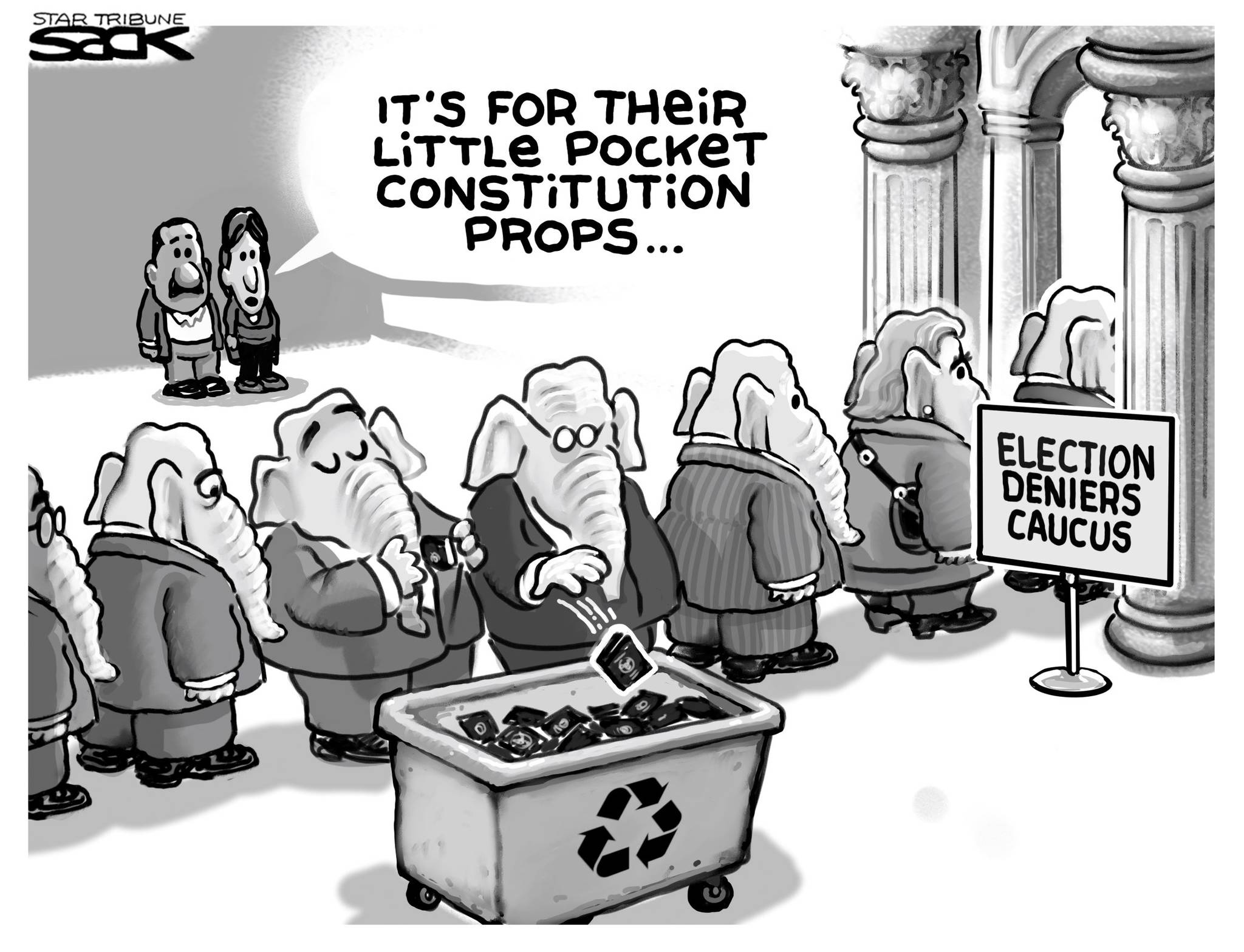By George Skelton
Los Angeles Times
We Americans are not particularly exceptional when compared with other people in the world. What makes our country great is a Constitution that provides us with liberty, democracy and opportunity.
It’s not that simple, of course. Americans still must respect and adhere to the document to make it work in real life. And the results aren’t always perfect.
But without the Constitution’s safeguards, we long ago could have followed other countries into fascist or communist totalitarianism. Nazi Germany and Stalinist Russia come to mind.
That’s my view, anyway. And it has been since I was a kid and started looking around at my fellow countrymen. Some seemed like frightened sheep with no backbone, others like bullies and bigots — the kind that could be conned and aroused by an ambitious demagogue such as Donald Trump or (fill in the dictator).
But I’m merely a layman political junkie. I called some constitutional scholars and asked them.
“Any society has people with a strong authoritarian impulse,” said Erwin Chemerinsky, dean of the UC Berkeley School of Law. “What the Constitution does is create guardrails.
“The guardrails were really tested this time. And they worked. This has been the most serious challenge to our democracy the country has ever seen.”
“It’s not American exceptionalism” that protects democracy, Chemerinsky added. “Too many countries in the world have gone authoritarian, and it could happen here. All democracies, including America’s, are fragile. We depend on the good faith of the people who govern.”
Clearly, throughout his four-year term, we could not depend on the good faith of President Trump, who last week incited the violent storming of the U.S. Capitol, a riot that cost at least five lives.
“You’ll never take back our country with weakness,” Trump declared, firing up the rioters at a rally and launching their attack. “You have to show strength, have to be strong.”
Trump defiled the presidency and embarrassed the country he promised to restore to greatness. It didn’t need restoring; it requires every president to “preserve, protect and defend” the Constitution. Instead, Trump tried to erode it and bamboozled 74 million Americans — including 6 million Californians — into voting for his reelection.
“I don’t think there is any inherent difference between people in the U.S. and the people who were in Germany” and enabled the Nazis, Chemerinsky said. “It could happen. All we can do is create a structure of government that makes it as unlikely as possible and rely on people to follow the law.”
I phoned Laurence Tribe, the esteemed Harvard Law School professor and constitutional expert.
“It’s not the language of the Constitution,” Tribe said. “It’s the fact we’ve had extraordinary people like Lincoln and FDR who have given it life.”
But he cautioned: “We could lose our way…. American exceptionalism is not a guarantee that [democracy] will last forever.
“Even in 2020, 74 million of us followed an authoritarian demagogue. We could have gone in all sorts of terrible directions, and we have been saved partly by the guardrails of the Constitution.
“We have been fortunate over time…. We don’t accept demagogues who incite mobs to take over another branch of government.”
That’s what Trump did when he urged the mob — some of whom were armed with guns and even bombs — to stop Congress from counting the electoral votes that unequivocally showed he lost to Democrat Joe Biden.
“We had an election. It was stolen from us,” Trump claimed, either lying or ignorant, or maybe both. “It was a landslide.”
Trump and his puppets filed dozens of lawsuits alleging election fraud. There was no substantive evidence, and courts kissed off the claims.
“I think American exceptionalism is greatly exaggerated,” said Richard Hasen, UC Irvine law and political science professor.
The U.S. can’t “perpetuate democracy without working hard at it,” Hasen continued. “Like every other country, it faces stresses and is facing great stress right now.”
The professor added: “If Trump had been a little more savvy, we could have witnessed the execution of many of our political leaders and an attempted military coup. I don’t think that’s an exaggeration at all.”
Executions? “If those protesters who went into the Capitol building had set off some bombs and killed the leadership of Congress, yes,” Hasen said.
Well, as despicable as Trump is, I don’t believe he’s a conscious murderer. Lacks savvy? Definitely.
UC Davis law professor Carlton Larson doesn’t agree that it’s the Constitution that particularly protects our democracy and freedoms.
“The United Kingdom has no written constitution and the average life of people there is not that much different than ours,” Larson said. “The Soviet Union had a constitution — all these great things — and it might as well have been written on toilet paper for all it’s worth.”
Larson credited the American system to “a shared political culture — a common belief in how the country best works.”
“One thing our Constitution does do really well,” he said, “it distributes power. It’s hard for one person to take over.”
With three equal branches of government, the president and Congress can’t do anything major without each other’s cooperation. And even then, the judiciary can declare it unconstitutional.
What Trump learned is that under the Constitution, the president has no power to delay elections, stop vote counting or interfere in ballot tabulations in any way. That’s up to the states, with a minor role granted to Congress. Much as he tried, Trump couldn’t halt mail voting.
Our president also cannot muzzle the news media, which he calls “the enemy of the people.”
“That’s what dictators always say,” Chemerinsky said.
My favorite constitutional amendment right now is the 20th. It decrees that Trump must leave the White House by noon Jan. 20.
Political columnist George Skelton has covered government and politics for nearly 60 years and for the Los Angeles Times since 1974.



